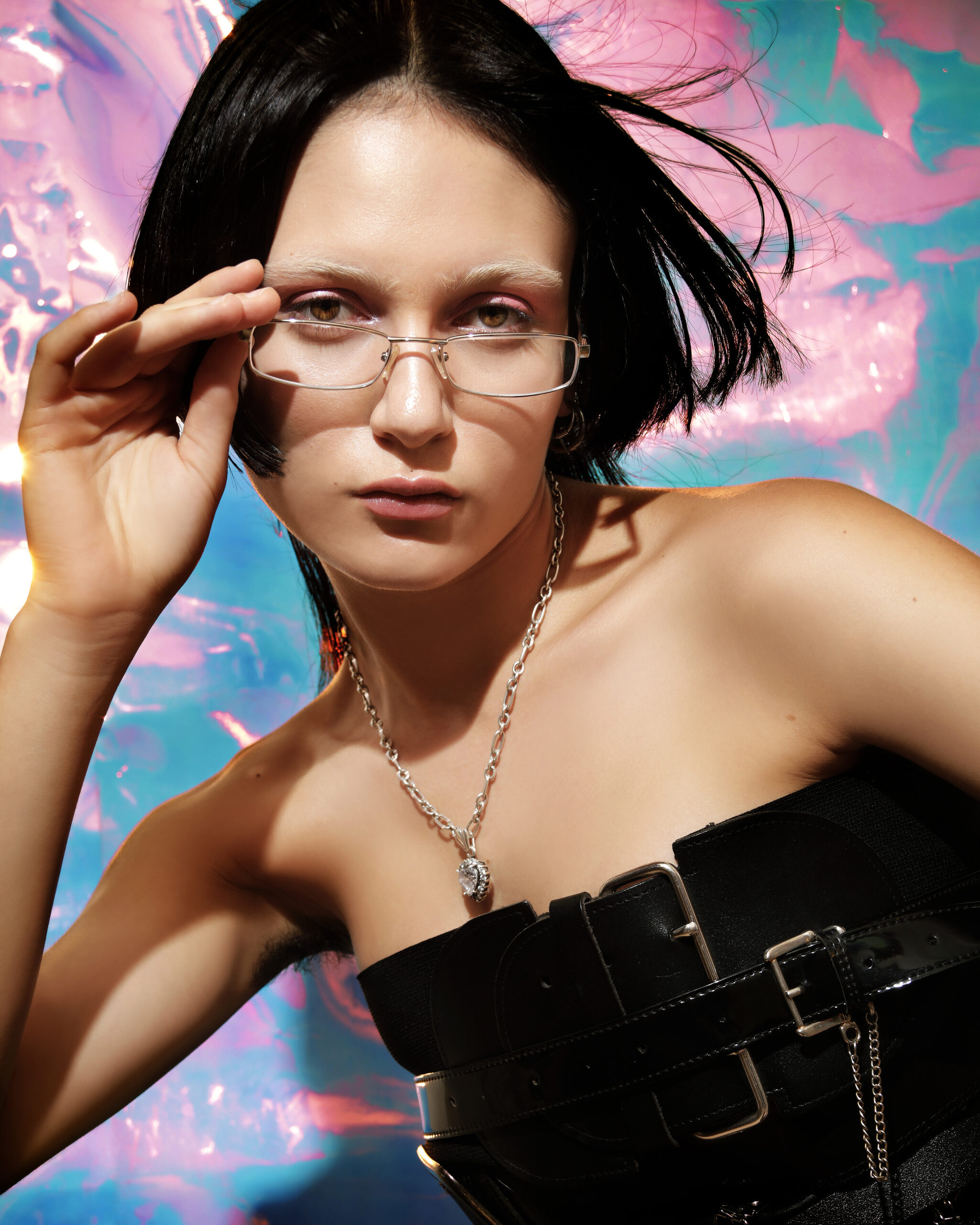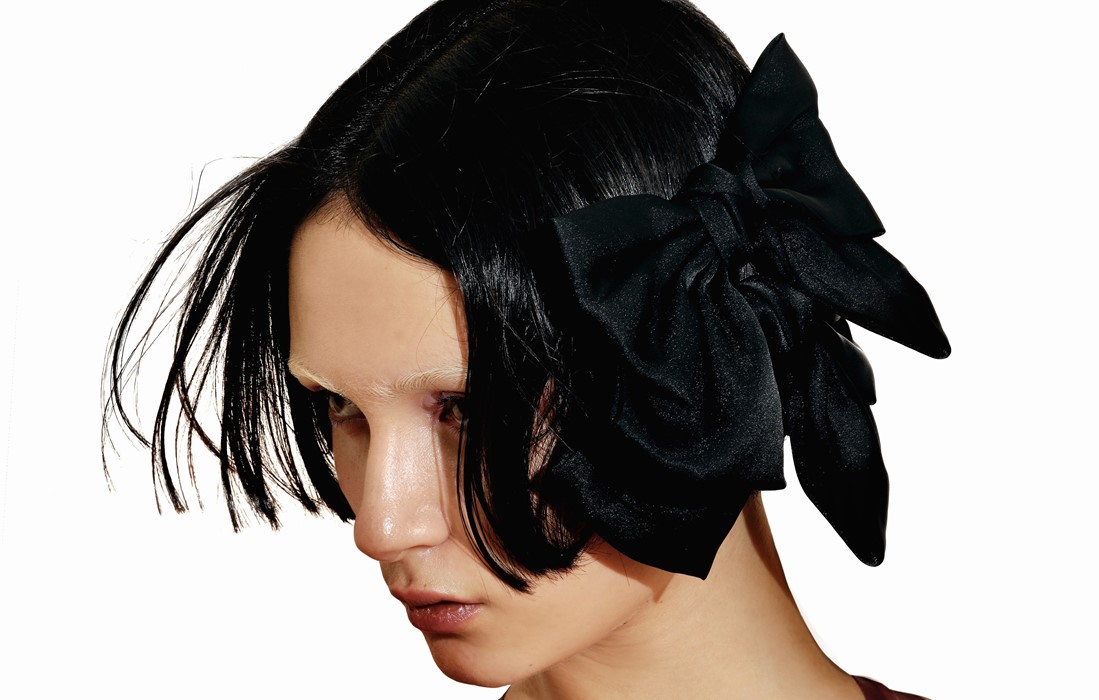“Nothing is only what it appears to be”

Maria Koutroumpi
Evita Manji‘s Spandrel? is one of those albums that anchor you with their weight and don’t let you look away until the journey is completed. Drawing on the interconnectedness of the global and the personal, the Athens-based paints a tragically beautiful picture of pain and grief, coloured by a sudden loss of their partner and never-ending environmental crisises sprung on our generation. The title comes from evolutionary biology – spandrel is a term referring to features of an organism that carry no obvious survival functions, and is derived from architecture, where it represents a small aesthetic element in the corner of an arch. With Manji’s hypnotising vocals burnt into the spiralling baroque-pop synths, deep bass and metallic productions, the album translates beyond the speakers and stings where it hurts. In light of the release, we caught up with Manji to learn more about the project, their unique sound, Athens’ creative scene and much more.
Hey – great to be in touch! How are you today?
Hi! I’m feeling good today, still processing my performance at Southbank Centre two days ago. I spontaneously decided to play the piano live for the first time and it felt really good. I’ve been thinking how I should start doing it more often.
Congratulations on the release of Spandrel? ! I really admire how probing the album is, tackling such monumental (and urgent) topics that are rarely approached in music industry. How are you feeling about the release?
Thank you, I’m glad you recognise the importance of its topics and how they’re rarely approached in music – it’s something that I think about a lot. I’m hoping I can bring some kind of awareness through my music, perhaps inspire other artists to address these issues too. To be honest, I think it will take a minute to fully realise it’s out, but all the love I’m receiving is heartwarming. I’ve been getting lots of messages from people about how Spandrel? has touched them, and it means the world to me. It makes me feel heard. The release definitely took a weight off my shoulders, even on a physical level. It’s hard to describe it but I feel more lightweight. Carrying this heavy body of work around for so long was a lot for someone with back problems!
I also love the name Spandrel? and what it stands for both literally and metaphorically. Can you tell me about the research and the inspiration that went into the body of work?
The inspiration came from experiencing loss on a personal level, on a universal level, from melancholia, death and grief, the consequences of climate change and environmental disasters to researching theories of identity, free will, time and black holes. I imagine Spandrel? as a network of everything mentioned above, and its main theme is to examine the connections between all of them instead of addressing them individually. As for the title itself, when I came across it, I immediately fell in love with it and its dual meaning. I started questioning wether a lot of things are spandrels or not, one of them being music. I’m much more interested in what’s debated to be a spandrel rather than what’s proven to be one.

Maria Koutroumpi
Your sound has been described as ‘evoking the church and the dancefloor without sacrificing the power of each polar element’. What draws you to these aspects and how do you maintain such a harmonious sonic balance between them?
I find this description pretty accurate! It really reflects my life experiences and relationship to music throughout my life. I used to sing in a church choir for many years so this element was a big part of me, which I then rejected as a teenager when I started being more drawn to electronic music and club spaces. Growing up and going through many different music phases, I felt some kind of pressure to identify with a sound. But experiencing traumatic loss really opened my eyes and taught me how I shouldn’t hold back and just be my most authentic self, embracing and honouring all the complex aspects and influences that make me the person I am, and my music is an extension of that. The balance comes naturally I guess, I just do whatever feels right.
Body/Prison is such a powerful track to me, and I love the lyrics – Break the time until you get upon me // A hologram of lies is trying to own me. Can you tell me a bit more about this and your approach to lyricism in general?
The first line is more abstract just like time itself, wondering wether one can go against it, stretch it, break it. “A hologram of lies is trying to own me” is a reference to our sense of self, how we construct our identity, get attached to it, trapped in it, which often makes us suffer. I generally like to write songs that hold multiple meanings.I feel like, in a way, it reflects the way the universe works. Beyond our individualistic understanding of it, everything is connected and nothing is only what it appears to be.
Apart from being a musician, you’re also a talented graphic designer and photographer, among other things. How do these different mediums come together in your artistry?
I haven’t been practicing any of these so much as I’m mainly focused on music at the moment but I was quite involved in the making of Spandrel?’s visuals, from being in the studio with my friend Hermes Pittakos envisioning the mask I’m wearing on the cover and helping him make it come to life, to handling the selection and post-production of the Spandrel? covers, including the ones of last year’s singles, to editing the collaborative video teaser we did with Young Boy Dancing Group for Closer to Midnight. I’ve been crocheting a lot though, and I feel like the pieces I make have become an elementary part of my identity.
You’ve also founded your own label myxoxym. What was the motivation behind it and what are some of your proudest moments since its conception?
I initially founded it to release my own music and curate compilations to support causes that again, are rarely supported by the music industry, such as animal rights and environmental causes. Though I soon realised putting music out requires a lot of work, so now it has become a very slow project. I don’t quite consider it a label, I like to see it as a slime mould that can change forms and adapt according to it’s needs… I guess it’s current form is a label! I’ve been exploring different directions it could take other than music but I’m definitely going to curate more compilations in the near future when I can give it the time and attention it deserves. My proudest moment I’d say was putting out PLASMODIUM I, I didn’t expect it to get so much support, both myxoxym and the compilation. It still surprises me and I’m really happy about it.
Tell me a bit about the creative scene in Athens – what is something you wish the world knew about your hometown?
Athens.. it’s becoming quite of a popular place to be but a lot of people have a pretty distorted idea about it. It’s definitely a beautiful place with a lot to offer, but when it comes to it’s creative scene, I personally find it uninspiring. There are definitely amazing artists in the city but not enough opportunities, resources and spaces for them to blossom and display their ideas.
Coming back to your music, I was also very moved by your latest single Closer to Midnight. You’ve said that the song is a reminder that ‘we are closer than ever to the ending point of life as we know it.’ What do you hope the future holds?
I don’t have much hope for the future, I would be very surprised if we’ll actually put the effort in and make the necessary changes to invert the damage we’ve caused to the planet. It’s definitely a fact that we’re closer than ever to the ending point of life as we know it, the consequences of climate change can be seen and felt more and more intensely, but there are still lots of people that doubt and ignore it. I guess part of me does hope there will be some kind of drastic change. But I also question the human understanding of time and sense of free will, perhaps the future is as unchangeable as the past and we have no control over our actions. Maybe it’s just meant to be this way. I really don’t know.
Notifications